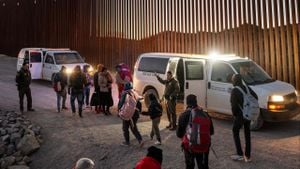WASHINTON — The mood among migrants waiting at the U.S.-Mexico border shifted dramatically on January 20, 2025. Just hours after President Donald Trump assumed office, the U.S. Customs and Border Protection (CBP) agency announced the cancellation of the CBP One app, which had been instrumental for many hopefuls seeking legal entry to the United States. For months, migrants from Haiti, Venezuela, and beyond had relied on the app, which had facilitated nearly 1 million legal entries since its introduction.
The abrupt end of the app, communicated through notifications on users' phones, left many with heavy hearts. “The existing appointments scheduled through CBP One are no longer valid,” read the app's final message. For countless families who had invested time, money, and hope, this cancellation has morphed anticipation of entry to despair.
María Mercado stood outside the border crossing at Tijuana, tears streaming down her face as she read the news. Her family, who had fled violence and hardship from Colombia, sat nearby with their small bags. Their scheduled appointment, which seemed to promise relief and safety just hours earlier, had vanished without any warning or means of appeal. “We don’t know what we will do,” she lamented, embodying the concerns of thousands left adrift.
The cancellation affects not only individual stories like Mercado's but also the operational framework for migrating to the U.S. Before its demise, the CBP One app had allocated 1,450 daily appointments at various border entry points, providing migrants with the opportunity to present their cases for asylum.
“This is effectively the end of humanitarian avenues for entry for many,” explained Matthew Hudak, former Deputy Chief of the Border Patrol. “Without alternative legal pathways, we can expect to see increases in illegal crossings, and potentially more chaos at the borders.”
For migrants such as Jairol Polo, who had painstakingly waited six months for his appointment, arriving at the border only to find his slot canceled was devastating. With his hopes dashed, Polo expressed frustration at the government's arbitrary decisions. “I just wanted what so many want—a chance for safety and security.”
The CBP One app had garnered significant user support, especially among Venezuelan and Haitian migrants seeking legal avenues to enter the U.S. It had been perceived as part of the Biden administration’s balance of managing immigration policy by forcing asylum seekers to follow legal routes, rather than overwhelming border authorities with unauthorized crossings.
Matthew Hudak pointed to this shift as emblematic of Trump’s tougher approach to immigration. “The fact is, the previous administration worked hard to create structures to allow legal entry and effectively manage migrant inflow. Now, with CBP One gone and the 'Remain in Mexico' policy reinstated, we are set for stricter regulations and more restrictions.”
President Trump's pledge to reinstate the 'Remain in Mexico' policy is raising alarm among many. This policy mandates asylum seekers to wait outside the U.S. as their claims are processed. It threatens to leave thousands of migrants vulnerable for extended periods, facing harsh conditions and uncertainty.
“Forcing people to wait on the Mexican side exposes them to danger; it’s already been proven. The government's promise of protection rings hollow when reality is so grim,” commented Juan Andrés Rincón Ramos, another Venezuelan migrant who had recently received the devastating cancellation notice after months of waiting for his chance to seek asylum with his brother living stateside.
The news of halted operations of CBP One reverberated not just through the border towns but all the way back to neighborhoods where these migrants had originally come from. Families justifiably felt disillusioned and angry after investing resources for what they thought was the last hope for safe asylum claims.
With increasing numbers trapped, struggling migrant shelters along the border experience massive surges again—unprepared to deal with what could become new waves of migrants. Critically, there are fears among aid organizations about how to handle the expected rise of people left without legal options.
“The abrupt termination of CBP One could incentivize illegal crossings, as the desperation grows among those affected,” explained former DHS officials. “Without CBP One, many migrants will be left wondering if they should risk entering without permission, with potential legal and personal consequences.”
For the communities involved, the complicated dynamics of immigration policy have immediate, personal consequences for families around the globe. The promise of refugee resettlement has faded overnight for those across various Latin American countries and beyond.
This early move by the Trump administration displays the hardline stance anticipated by many, indicating drastic changes from past policies. Advocates, lawmakers, and affected individuals alike have voiced their concerns about the humanitarian costs associated with these immediate shifts. The disillusionment felt by many has quickly transitioned to anger at the process and policymakers responsible for such abrupt policy reversals.
The future remains uncertain for these families and their dreams of entering the United States, having faced yet another setback. With alternatives eclipsing, they ponder the question: can anyone help them navigate this bureaucratic maze, or will they be forced to plunge headlong toward the unknown?



